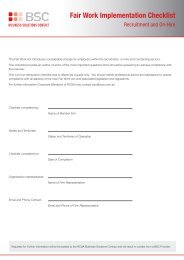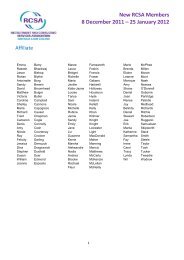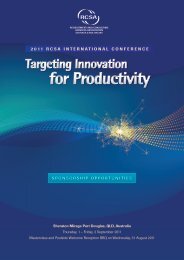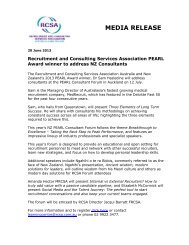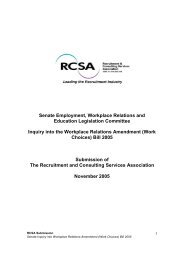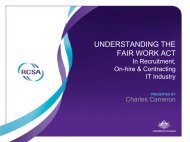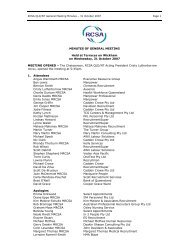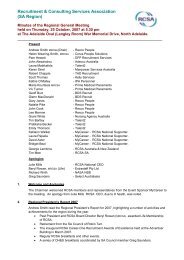Unfair Dismissal - RCSA
Unfair Dismissal - RCSA
Unfair Dismissal - RCSA
Create successful ePaper yourself
Turn your PDF publications into a flip-book with our unique Google optimized e-Paper software.
The qualifying period of employment to be<br />
served before an employee could make an<br />
unfair dismissal claim was six months, or a<br />
shorter or longer period determined in<br />
written agreement between the employer<br />
and employee before employment<br />
commenced.<br />
An unfair dismissal claim could not be made<br />
if the dismissal was for genuine operational<br />
reasons or for reasons that included genuine<br />
operational reasons. Operational reasons<br />
were of an economic, technological,<br />
structural or similar nature relating to the<br />
employer’s business.<br />
An employee must have served a minimum<br />
employment period of twelve months if they<br />
are employed in a business with less than 15<br />
employees, or six months in businesses with<br />
15 of more employees before they can make<br />
an unfair dismissal claim.<br />
Operational reasons are not a feature of the<br />
Fair Work Act 2009. However, a dismissal<br />
will not be unfair if Fair Work Australia is<br />
satisfied it was a genuine redundancy.<br />
Key Points<br />
• Fair Work Australia will determine whether a dismissal is unfair by determining<br />
whether the dismissal was harsh, unjust or unreasonable.<br />
• A dismissal is not unfair where there is a genuine redundancy.<br />
• An employee can make an unfair dismissal claim regardless of business size, as long as<br />
they have completed the minimum employment period and meet the other statutory<br />
requirements.<br />
• The minimum employment period to be eligible to apply for an unfair dismissal case is<br />
12 months for employees of a small business and six months for all other employees.<br />
• Employees employed for a specified period or task are not protected by unfair<br />
dismissal laws if their employment is terminated at the completion of that period or<br />
task.<br />
Small Business Fair <strong>Dismissal</strong> Code (Section 388)<br />
The Small Business Fair <strong>Dismissal</strong> Code is not a compulsory requirement. However, if a<br />
person’s dismissal is consistent with the Small Business Fair <strong>Dismissal</strong> Code then the<br />
dismissal will be considered fair (only relevant where the employer is a small business<br />
employer) (Section 396).<br />
What is considered a small business?<br />
From 1 July 2009 until 31 December 2010, the number of employees used to define a small<br />
business will be fewer than 15 full‐time equivalent employees at the time of the dismissal or<br />
notice of dismissal (whichever is earlier).<br />
From 1 January 2011, the number of employees used to define a small business will be<br />
based on a headcount of employees (regardless of whether they are full‐time equivalent<br />
employees) at the time of the dismissal or notice of dismissal (whichever is earlier).<br />
How does the Small Business Fair <strong>Dismissal</strong> Code work?<br />
The Small Business Fair <strong>Dismissal</strong> Code describes the steps for a small business employer to<br />
follow when dismissing an employee. If the employee’s dismissal is consistent with the Small<br />
Business Fair <strong>Dismissal</strong> Code, then the dismissal will be considered fair.<br />
5



